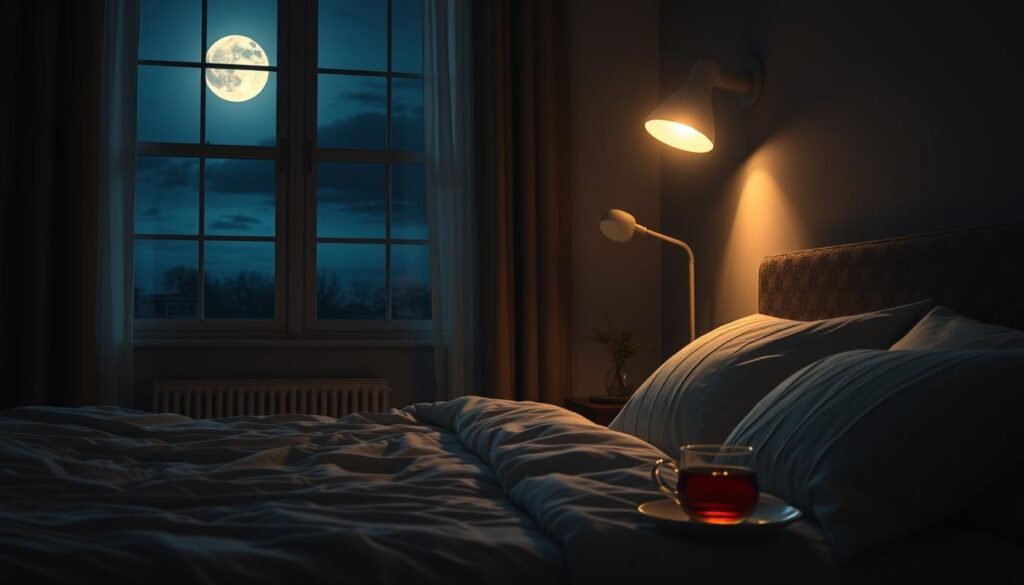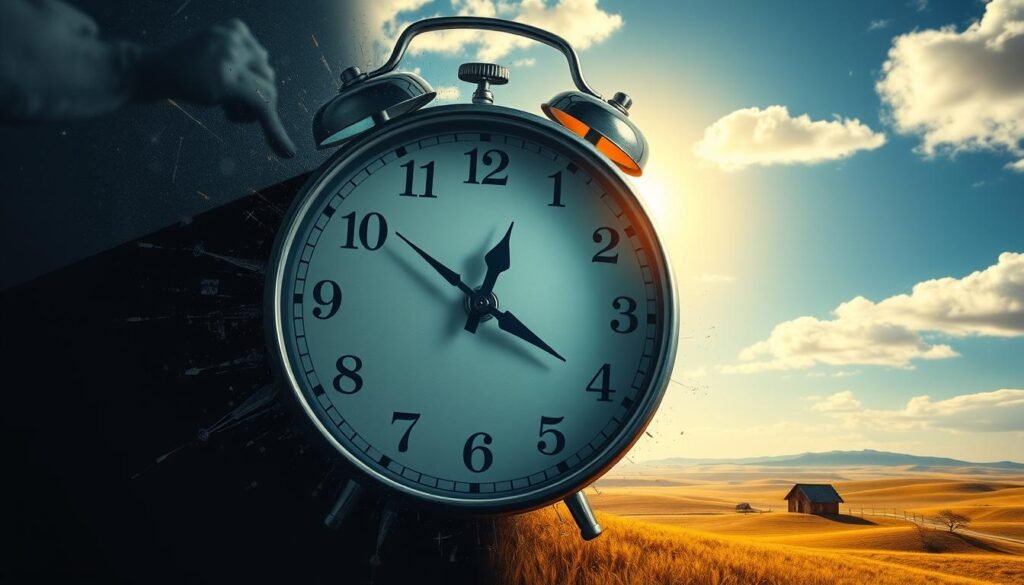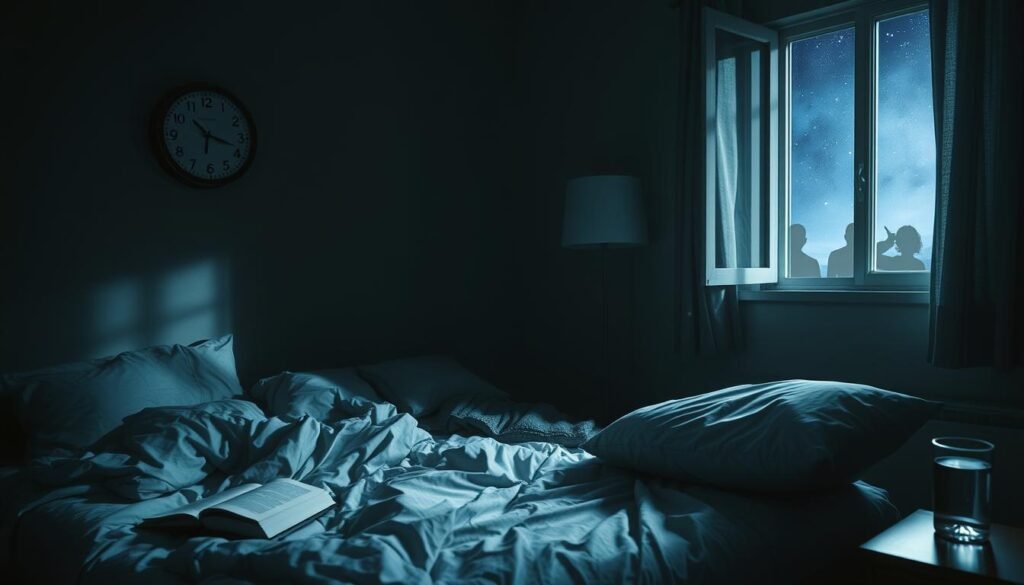Did you know over 37% of individuals often struggle to fall asleep? This reveals a widespread issue that affects our mental health and everyday life. Insomnia does more than make it hard to sleep; it also challenges our overall health.
The impacts of insufficient sleep reach far, affecting our mood, drive, and life quality.
Dealing with insomnia means recognizing the role of stress, diet, and where you sleep. It’s vital to address these factors to better your sleep. This article will share effective tips for creating good sleep habits and living healthier.
Key Takeaways
- Insomnia affects a large percentage of the population, with many reporting persistent sleep issues.
- Maintaining a consistent sleep schedule can significantly enhance sleep quality.
- Avoiding caffeine and alcohol is vital for better sleep hygiene.
- Creating a calming bedtime routine can help signal to the body that it’s time to rest.
- Stress management techniques play a key role in combating sleep anxiety and disruptions.
- Exercise, when done earlier in the day, can improve overall sleep duration and quality.
Understanding Insomnia and Its Causes
Insomnia affects many adults, who need 7 to 9 hours of sleep but often get less. It’s a problem of not falling or staying asleep. This leads to being very tired in the day and other issues.
To manage insomnia, we must understand its causes. Short-term insomnia is brief and usually due to stress. But chronic insomnia lasts for months and comes from various sources. These include:
- Stress from work or personal life
- Poor sleep habits
- Mental health disorders like anxiety and depression
- Medical conditions such as restless leg syndrome
- Hormonal changes, especially in women during the menstrual cycle or menopause
As people get older, insomnia becomes more common. Changes in sleep patterns and health make it more likely. Kids and teens also face sleep challenges, often because their internal clocks are delayed. Women are more likely to have insomnia than men, mainly because of hormone changes.
Insomnia’s effects can be harsh, hurting health, work, school, and increasing accident risks. It can lead to serious health problems like high blood pressure and heart disease. Good sleep habits, mental health care, and sometimes medicine, can help improve sleep.
If you have trouble sleeping or feel tired during the day, see a health professional. Understanding how mental health and sleep are connected can help find better treatments.
Importance of Sleep for Overall Health
Sleep is key to our health, touching both Mental Health and Physical Health. Not getting enough sleep can cause many health issues. These include problems with thinking, mood changes, and a weaker immune system. People who don’t make sleep a priority may face issues like brain fog, trouble concentrating, and difficulties with daily tasks.
How much sleep we need changes with age. School kids need at least nine hours each night. Teens should get eight to ten hours, and adults need seven hours or more. This shows how vital Sleep Importance is at different times in our lives.
Many suffer from chronic insomnia, which means having trouble sleeping for three months or more. It can lead to other problems like sleep apnea, where breathing stops and starts during sleep. This makes you feel more tired. Learning about sleep disorders is important for recovery.
Good sleep is not just good for our minds but our bodies too. Our bodies fix themselves during sleep. This helps with recovery and keeps our metabolism working well. People who sleep well are healthier, less stressed, and have better heart health.
Understanding sleep’s role in mental and physical health shows why good sleep matters. Getting help for sleep problems, through therapy or CPAP machines, can greatly improve your life.
| Age Group | Recommended Sleep Hours |
|---|---|
| Newborns (0-3 months) | 14-17 hours |
| Infants (4-12 months) | 12-16 hours |
| Toddlers (1-2 years) | 11-14 hours |
| Preschoolers (3-5 years) | 10-13 hours |
| School-age children (6-12 years) | 9-12 hours |
| Teenagers (13-17 years) | 8-10 hours |
| Adults (18-60 years) | 7 or more hours |
| Adults (61-64 years) | 7-9 hours |
| Adults (65+ years) | 7-8 hours |
Exploring the Concept of Sleep Onset Latency
Sleep Onset Latency is the time it takes to fall asleep from being fully awake. It is key for understanding our sleep health. A healthy Time to Sleep ranges from 10 to 20 minutes. But, taking less than eight minutes can mean too much sleepiness from not sleeping enough or having sleep problems.
Many things can make it harder to fall asleep quickly. Stress, anxiety, bad sleep habits, and noise can delay sleep. Drinking alcohol might seem to help you fall asleep faster, but it actually makes your sleep worse. Pain can also stop you from falling asleep, making it hard to get good rest.
In clinics, doctors aim for a sleep efficiency of over 85%. This is the ratio of sleep time versus time spent in bed. Long sleep latency can mess up reaching a complete sleep cycle of 90 to 120 minutes. Also, missing out on sleep builds up and affects how quickly you fall asleep.
Keeping an eye on how fast you fall asleep can reveal health issues. It helps you know your sleep habits better. You can change your daily habits to improve how well you sleep. Tools like sleep studies, the Multiple Sleep Latency Test, and sleep diaries are useful for tracking sleep onset.
Difficulty Falling Asleep: Common Triggers
Many things can cause insomnia, making it hard to fall asleep. Stress from day-to-day life has a big impact, along with anxiety that seems to show up more at night. These feelings can make it hard to sleep and keep the problem going.
Where you sleep matters a lot, too. Noise, too much light, or being too hot or cold can make you feel stress. It can make getting to sleep hard. For some, chronic pain makes sleeping well even harder, adding to anxiety and sleep troubles.
How you live can also affect your sleep. Drinking caffeine or smoking can keep you awake when you want to sleep. Having a busy schedule can mess up when you sleep, leading to more sleep problems.
It’s important to know what causes your insomnia. Writing down when you sleep can help reveal what makes your anxiety and stress worse. Working to change these things is key for better sleep.
| Common Triggers | Description |
|---|---|
| Stress | Emotional pressures that affect relaxation and sleep onset. |
| Anxiety | Persistent worries that create restlessness at bedtime. |
| Caffeine Intake | Stimulants that interfere with the ability to fall asleep. |
| Environmental Factors | Noise and light disturbances that disrupt a peaceful sleep environment. |
| Chronic Pain | Conditions that make comfort elusive, leading to awakenings during the night. |
Dealing with these triggers means looking at how you feel and your environment. This can help you sleep better at night.
Effective Bedtime Routines for Better Sleep
Creating effective bedtime routines is key for better sleep. Doing activities 30 to 60 minutes before bed tells your brain it’s time to relax. This is especially helpful for those who have trouble sleeping.
Creating a Calming Environment
Turning your bedroom into a calming environment is crucial. You should:
- Maintain a cool, dark, and quiet space to help you relax.
- Limit screen time before bed to avoid distractions.
- Use deep breathing, listen to music, or try muscle relaxation to feel calm.
- Take a warm bath. It helps your body feel ready to rest.
- Reading or journaling can help you clear your mind before sleep.
These tips help create the right setting for a good night’s sleep.
Importance of Consistent Sleep Schedule
Keeping a regular sleep schedule trains your brain to feel tired at bedtime. Having set sleeping and waking times helps your body know when to rest. Here are some important tips:
- Avoid big meals and alcohol before bedtime, as they can keep you awake.
- If you’re hungry, choose light snacks like fruit or yogurt.
- Remember, caffeine during the day can impact your sleep.
- Exercise is good, but relax for a few hours before going to bed.
These bedtime routines will help you sleep better and feel more rested.
Managing Sleep Disorders: When to Seek Help
It’s vital to understand sleep disorders and their impact on health. Many people struggle with sleep issues and need guidance. Sleep apnea and restless legs syndrome are common, highlighting the need for symptom awareness and treatment.
Common Sleep Disorders Associated with Insomnia
There are more than 100 sleep disorders, but some are linked to insomnia more often. The most common ones include:
- Sleep Apnea: This condition stops your breathing temporarily during sleep, causing daytime tiredness.
- Insomnia: Difficulty starting or keeping sleep, often due to stress or health issues.
- Narcolepsy: Leads to unexpected sleep attacks, affecting your day.
- Restless Legs Syndrome (RLS): Causes a need to move your legs, which can prevent sleep.
- REM Sleep Behavior Disorder: People act out dreams, disturbing sleep for themselves and others.
If symptoms last more than four weeks, see a doctor. This is especially true if sleep problems cause tiredness or trouble focusing during the day.
How Medical Conditions Affect Sleep Quality
Chronic conditions like heart disease, diabetes, and obesity can lead to sleep trouble. It’s important to recognize signs like:
- Hard time falling or staying asleep
- Loud snoring
- Feeling very tired during the day
- Trouble focusing
- Dozing off while driving or in other situations
To tackle sleep disorders, combining behavioral therapy with better sleep habits can help. If these steps don’t improve things, a sleep study might be needed. This study looks at your body’s functions as you sleep, which can show why you’re not sleeping well.

Reducing Sleep Deprivation Through Lifestyle Changes
Making effective lifestyle changes is key to fighting sleep deprivation and improving sleep quality. Simple changes in daily habits, like managing caffeine and alcohol intake, can greatly better sleep. Knowing how these substances affect sleep helps people make smart choices.
Limiting Caffeine and Alcohol Intake
Drinking caffeine in the afternoon and evening can make it hard to fall asleep. It’s smart to cut back on caffeine as it can increase sleep deprivation. Though alcohol might seem to help sleep at first, it usually hurts sleep quality later on. Reducing alcohol before bed can lead to better sleep.
Role of Regular Exercise in Improving Sleep
Regular physical activity leads to better sleep. It helps you fall asleep quicker and deepens sleep. For the best sleep, exercise earlier in the day and avoid intense workouts before bedtime. Adding exercise to your daily routine can effectively tackle sleep deprivation.
| Lifestyle Change | Impact on Sleep |
|---|---|
| Limit Caffeine Intake | Reduces sleep onset latency and improves sleep quality |
| Reduce Alcohol Consumption | Avoids disruptions during sleep cycles after initial sleepiness |
| Regular Exercise | Enhances sleep duration and quality; increases sleep efficiency |
| Consistent Sleep Schedule | Regulates the body’s internal clock and improves sleep consistency |
Identifying Circadian Rhythm Disturbances
Many people face issues with their circadian rhythms, which messes with their sleep. These problems often result from our body clocks not matching our environment. For example, using screens at night can make falling asleep hard.
Disruptions can come from different sources. Sleep schedules, life habits, and not enough daylight play a part. Our body’s clock tends to run a bit longer than 24 hours. This slight difference can cause trouble like delayed sleep phase disorder or challenges for those working night shifts.
To figure out these problems, experts look at when we sleep and wake up. They also check things like melatonin levels and body temperature. People might experience insomnia or feel very sleepy during the day. It’s important to identify these signs to diagnose circadian issues correctly.
There are ways to make sleep better. Getting daytime light and sticking to a sleep schedule helps. Sometimes, taking melatonin supplements is recommended. Physical activities can also help adjust our body clocks, similar to natural light.
| Type of Circadian Rhythm Sleep Disorder | Symptoms | Treatment Options |
|---|---|---|
| Delayed Sleep Phase Disorder | Difficulty falling asleep until late | Bright light therapy, melatonin supplements |
| Advanced Sleep Phase Disorder | Early sleep onset and waking | Light exposure at night |
| Irregular Sleep-Wake Rhythm Disorder | Multiple sleep episodes throughout the day | Structured sleep schedules |
| Shift Work Disorder | Sleep difficulties due to night shifts | Cognitive Behavioral Therapy for Insomnia (CBT-I) |
| Jet Lag | Sleep disruption from long-distance travel | Gradual adjustment of sleep timing |

Techniques to Combat Sleep Anxiety
Sleep anxiety is a big problem for many seeking a peaceful night. Knowing different methods can help people take back their calm at night. Mindfulness practices, meditation, and certain therapies can really help with sleep issues.
Mindfulness and Meditation Practices
Mindfulness and meditation can significantly lower sleep anxiety. These methods calm the mind and help focus on now, not bedtime worries. Deep breathing, relaxing muscles progressively, and using guided imagery can help a lot.
Studies show that meditating for just a short time each day can make relaxation and sleep better. Some helpful mindfulness activities are:
- Breathing exercises to improve relaxation.
- Progressive muscle relaxation to ease body tension.
- Writing down thoughts before bed to clear the mind.
- Doing yoga to bring together body and mind.
Cognitive Behavioral Therapy Techniques
Cognitive Behavioral Therapy (CBT) is key for fighting sleep anxiety. It deals with the negative thoughts and behaviors that mess up sleep. CBT works by changing bad thoughts about sleep into good ones.
CBT has several important methods:
- Sleep restriction therapy to keep a regular sleep schedule.
- Stimulus control to link bed only with sleep.
- Identifying and arguing against sleep-related anxious thoughts.
- Setting a bedtime routine to tell the body it’s time to wind down.
Using meditation and CBT can really help with sleep anxiety. These strategies fix immediate issues and help build long-lasting healthy sleep habits. Spending time on these methods can greatly reduce anxiety and lead to better sleep.
Tips for Managing Restlessness at Night
To achieve restorative sleep, managing restlessness at night is key. Creating a peaceful space tells your brain it’s time to relax. Start with a calm sleep area. Also, use relaxation methods to get your mind and body ready for rest.
Setting a Calm and Uncluttered Sleep Space
Making your sleep area organized and peaceful helps cut distractions. Try these tips to improve your sleep environment:
- Keep the bedroom tidy and free of clutter.
- Utilize calming colors and soft lighting to create a soothing atmosphere.
- Invest in comfortable bedding and pillows that support restful sleep.
- Maintain a cool room temperature, around 60 to 67 degrees Fahrenheit.
- Limit noise and use white noise machines if necessary to mask disruptive sounds.
Relaxation Methods Before Bedtime
To lessen restlessness at night, try relaxation techniques. These methods work well:
- Deep breathing exercises: A few minutes of deep breathing calms your nerves.
- Gentle stretching: Do some light stretches to ease the day’s tension.
- Warm baths: A warm bath before bed helps drop your body temperature, readying you for sleep.
- Mindfulness practices: Mindfulness or meditation focuses your mind, lowers anxiety, and relaxes you.
Using these relaxation techniques can get you ready for sleep. This helps with problems like insomnia. For more tips on sleep issues, check out expert advice on insomnia.

| Relaxation Method | Benefit |
|---|---|
| Deep Breathing | Calms the nervous system |
| Gentle Stretching | Relieves physical tension |
| Warm Baths | Signals readiness for sleep |
| Mindfulness Practices | Reduces anxiety |
Conclusion
Understanding the complexity of insomnia is key. Research shows that many people have sleep problems at some time. For those with ongoing issues, it’s important to find effective sleep methods.
To improve sleep, try setting a steady bedtime and look into helpful habits. Cognitive behavioral therapy (CBT-I) is also a good option. Knowing what makes you more likely to have insomnia, like age or health, helps too.
Making sleep a priority does wonders for your health. It helps avoid serious issues like heart disease linked to not sleeping well. By applying these tips, you can enjoy better sleep and a happier life.